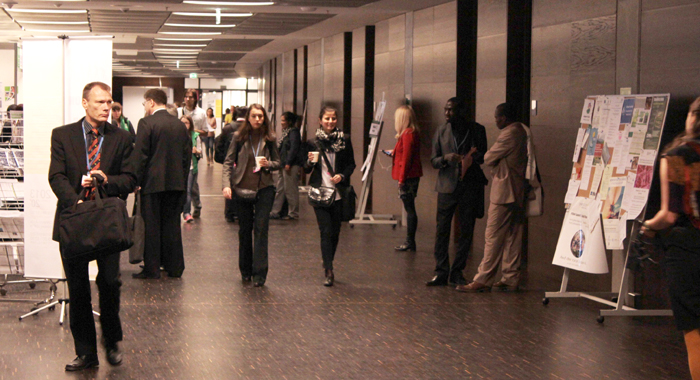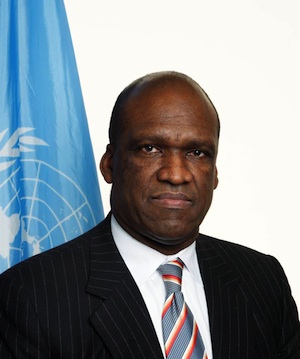

By Kenton X. Chance
WARSAW, Poland — The high level segment of the global climate change summit began Tuesday with Antigua and Barbuda diplomat, John W. Ashe, president of the 68th Session of the United Nations General Assembly, saying it is time for real progress on the issue of climate change.
“It is time to make real progress on this vexing and frequently divisive issue, which includes financing, technology transfer and capacity building,” he told the United Nations Framework Convention on Climate Change (UNFCCC) 19th Session of the Conference of the Parties (COP 19) and the ninth session of the Conference of the Parties serving as the meeting of the Parties to the Kyoto Protocol (CMP 9).
He said that while progress has been made with the Green Climate Fund and the Climate Technology Centre and Network, it is not enough to adequately tackle the challenges that the world will face through climate change.
Ashe cited the Intergovernmental Panel on Climate Change’s (IPCC) most recent report, which highlighted that climate change impacts and developmental issues are inextricably linked.
“It is therefore imperative that we approach financing for sustainable development and climate finance in a coherent manner. This means addressing the artificial disconnect between climate change and the multilateral development process in regards to financing,” he said.
He said that within each of the 190 countries represented at the climate talks, there is a wealth of knowledge and experience about how to reduce greenhouse gas emissions, extend energy access, make economies more efficient, reduce local air pollution, and limit vulnerability to fluctuations in the price of fuel.
“We have solutions — good solutions — we just need to implement them and deploy them faster.”
Ashe further said that the IPCC has indicated that by 2050, with the right instruments in place, some 70 per cent of energy needs could come from renewable resources.
“The further we advance in the negotiations around this table, the closer we get to bringing about a green growth revolution,” he said, adding, “But it’s true that the world is increasingly becoming frustrated at the pace at which we take decisions under the Convention.
“Civil society, the private sector, and local governments from the global north and south have all grabbed the proverbial bull by the horns and have taken on this cause,” Ashe said, adding that these entities “recognize the sheer urgency and they are raising awareness, innovating new ideas and transforming their environments as we sit here.
“But they are also looking at these negotiations, and saying what has changed in the last 20 years? They are asking why we have abdicated our responsibilities. Why are we not fulfilling our roles as leaders?
“The time has come for you to push back. For you to stand up and say: yes we will. Yes, we will do something. We will act. Not tomorrow, not next week, but right here. Today!” Ashe further stated.
Ashe said that that recent catastrophic events have made it “all the more obvious that action is needed.
“They call for resolute measures and a vision well beyond the usual political posturing; they require a political willingness by climate change negotiators, and indeed all people, to look beyond our particular narrow interests and focus instead on the common good for all.”
He quoted the saying that neither time, nor tide waits for anyone, adding, “in this case [it] is a tough truism in a world impacted by the adverse effects of climate change.
“The people of this world who are outside of this room are waiting for us to act and they have been waiting for a long time,” he said at the ceremony at the National Stadium here.
“These negotiations must begin to yield true benefits, beginning now. I urge you to match the rising conviction that is already evident around the world. Draw on your strength and your sense of global solidarity to take the difficult decisions — the ones that benefit all people and the generations yet to come.”
Ashe further gave “one heartfelt appeal:
“Do what needs to be done for 2015 — if not for yourself — then for the children both present and for those yet to come”.
He said that if delegates individually scan the horizon of the intergovernmental climate change negotiations process — which they also control and will ultimately be held accountable for in the long run, they will hold four truths to be “self- evident”.
They must reach a deal by 2015; this deal must be comprehensive and must of necessity bind them all; it should contain the necessary means of implementation; and, “to avoid what has typically become a mad dash as the end of the negotiation horizon closes upon us, we should begin to put in place the necessary elements of the 2015 deal right now and right here at this COP,” Ashe said.
Parties to the convention have agreed to ink a deal in France in 2015, following next year’s talks in Peru.
Ashe said that Parties need to take in Warsaw decisive steps towards the onward journey in Lima and finally to Paris.
He said this means addressing a number of items, which include, the fact that emissions are set to peak by 2015 and addressing the pre-2020 ambition gap and, taking into account the results of the 2013-2015 review of the long term global goal.
Ashe also mentioned operationalizing and capitalizing post the Green Climate Fund; putting in place the relevant compliance mechanisms that will be essential for any legally binding agreement, which will be applicable to all Parties; and, ensuring the linkages of any future agreement to existing structures under the UNFCCC.
Meanwhile, UN Secretary General, Ban Ki-moon, in his address to the ceremony, said climate change “threatens current and future generations.
“We need look no further than last week’s catastrophe in the Philippines,” he said.
Some 3,000 persons died in that storm, which also displaced millions.
He said that all around the world, people now face and fear the wrath of a warming planet.
“The science is clear. Human activities are the dominant cause of climate change. We cannot blame nature,” he further stated, nothing, “We are the first humans ever to breathe air with 400 parts per million of carbon dioxide.
“The consequences are profound, dangerous and known to [us] all. We must rise to these challenges with wisdom, urgency and resolve to address climate change.”
Ban said he was “deeply concerned that the scale of our actions is still insufficient to limit global temperature rise to below 2 degrees Celsius from pre-industrial levels.
“But I am also hopeful because I see opportunity and progress on multiple fronts towards a low-carbon future.”
He said that while Parties have “a steep climb ahead”, he sees four areas for action.
He said those countries that have not yet done so should swiftly ratify the second commitment period of the Kyoto Protocol, agreed in Doha and also called on Parties to step up [on] finance, including long-term finance and the Green Climate Fund.
He further said progress on funding for adaptation and mitigation can fuel confidence and scale up action on the ground.
“To achieve the large-scale transformation necessary to stabilize the climate, nations must meet their climate finance commitments and make new targets much bolder. They must also send the right policy signals for investment,” Ban further said.
Nations have agreed to scale up to US$100 billion annually by 2020 their contribution to climate finance.
Ban urged Parties to construct an action agenda to meet the climate challenge.
“Current pledges are simply inadequate. Here, too, we must set the bar higher,” he said.
“… we must lay firm foundations for the 2015 agreement. Success in Paris means bringing substantive progress to Lima. That means [in] Warsaw here we have to build a crucial stepping-stone,” the UN Secretary-General said.





